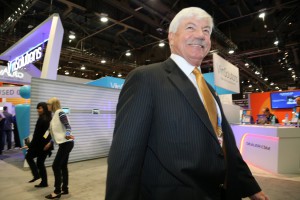
NADA Chairman Jeff Carlson told the Automotive Press Association in Detroit that federal regulation amounts to a $600 tax on a new car.
Federal regulation of everything from financing and fuel-economy to the handling of recalls amount to the equivalent of a tax on consumers, Jeff Carlson, chairman of the National Automobile Dealers Association, said during an appearance in Detroit.
Carlson is president of Glenwood Springs Ford and Glenwood Springs Subaru in Glenwood Springs, Colorado, and Summit Ford in Silverthorne, Colorado, said rules set down by the federal Consumer Financing Protection Bureau, one of the NADA’s top target, added up to $600 to the price of a new vehicle.
“Washington doesn’t always understand the unintended consequences of their actions,” Carlson said during a meeting of the Automotive Press Association in Detroit.
Regulations surrounding recalls can lower the value of trade-in by hundreds of dealers because recalled vehicles cannot be resold by dealers. Dealers have to wait until the vehicle is repaired to sell, but in the meantime the value of car with a recall notice attached to its drops by hundreds of dollars.
(Ford, Trump aim for truce. For more, Click Here.)
Consumers can lose anywhere from $600 to $6,000, he said.
Fuel-economy regulations also add substantial cost to new vehicle at a time when fewer consumers reported that are able to afford a new vehicle, Carlson said citing data compiled by Cox Automotive in which 57% of the respondents to a survey could not afford a new car.
The Cox data also showed that the price of new cars has increased by less than the rate of inflation but the median income of American households also has declined during the past two decades, making the purchase of new vehicle more difficult.
(Click Here for details about Obama’s commitment to zero traffic deaths.)
Carlson also defended the franchise law system, which protects dealers from direct competition by manufacturers. The State of Michigan, which requires carmakers to operate through franchised dealers, effectively prohibits Tesla from selling cars directly to customers in Detroit or Grand Rapids.
Carlson said Michigan’s position is absolutely correct. The fact is the “intra-brand” competition fostered by the dealer system saves consumers on average $700 per transaction. If manufacturers could sell directly to consumers, retail prices would go higher, Carlson said, and the savings would disappear.
Franchised dealers are flexible and have adapted to the changes in the retail environment. Dealers stock a large number of cars across the country and can deliver the correct vehicle to a customer’s doorstep.
(With autonomous rules, feds take next step toward revolution. For more, Click Here.)
“I can out Amazon Amazon,” he said. “I deliver cars all the time.”
